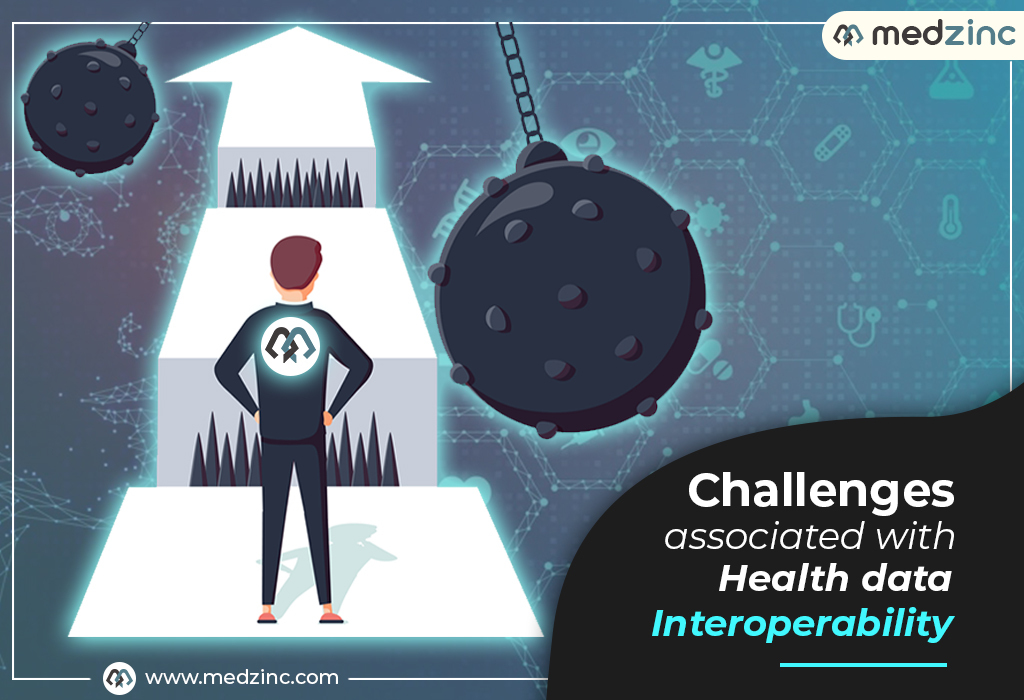
What are the major challenges associated with Health Data Interoperability?
As the healthcare industry transitions from a volume-based to a value-based system, data interoperability is becoming critical to providing high-quality care. Interoperability of health data is one of the most pressing issues confronting the healthcare industry today. Because different health information systems use different protocols, this is the case. Transferring data between health information systems is a herculean task. Furthermore, as healthcare data becomes more widely available, it is not being shared among the many different healthcare organisations. This blog examines the challenges associated with Health Data Interoperability (HDI). Furthermore, it will emphasise the role of medzinc in overcoming the challenges associated with HDI. However, before we get into the challenges associated with Health Data Interoperability. It would be wonderful to get a sense of what Health Data Interoperability entails. Note: In the blog, HDI stands for Health Data Interoperability.
Health Data Interoperability
The term “health data interoperability” refers to the ability of different health information systems to communicate with each other and exchange data. Moreover, interoperability of health data is essential to achieving the goal of providing seamless care coordination to patients.. Leading benefits of Health Data Interoperability There are a number Leading benefits of HDI , including
- Increasing the effectiveness of healthcare
- Lowering healthcare costs
- Enhancing care quality and patient experience
- Keeping patient data secure
- Minimising physician burnout
- Availability of patient data across systems
- Easy sharing medical data with providers
- Reducing clinical errors in clinical diagnostics
Major Challenges associated with Health Data Interoperability
The advantages of using HDI with health information systems are pretty obvious. However, there are a number of significant challenges associated with health data interoperability, including
- High Cost of managing health information systems
The cost of managing health information systems is extremely high in terms of both money and time. Managing a single health data system is time-consuming. Because, no single person in most healthcare settings has the time, let alone the qualifications, to keep up with this daily task. Furthermore, particularly for smaller organisations, hiring someone qualified to maintain multiple health information systems interoperability is costly.
- Plethora of standardised data
Data is becoming increasingly difficult to access, which is a growing trend. This is because data is frequently stored in various formats that can only be accessed by designated software applications. This makes it difficult for people to obtain the information they require in a timely manner. Furthermore, data is frequently dispersed across multiple platforms, making it difficult to obtain a complete picture.
- Inconsistent Patient information across medical network ( Huge Problem)
Inconsistency of patient information is one of the major challenges associated with health data interoperability. Moreover, different providers manage and store patient information in different ways. Providers disperse data in multiple pieces across multiple locations, wasting valuable time. The health IT department must spend countless hours searching for and collecting them. This can make information sharing between providers difficult. Furthermore, this causes confusion and inconsistency. Plus, leads to delay in effective clinical diagnostics.
- Challenge in validating patient information electronically
The challenge in validating patient information is that there is no definitive source of patient information. As patient information is spread across the systems in multiple pieces. Moreover, the data stored is often incomplete or inaccurate. Thus making it difficult to get a complete and accurate picture of patient health. The electronic validation of patient information is further complicated by the fact that data is stored in different formats in different platforms. This makes it difficult to exchange data with different systems and in different formats.
Role of medzinc in overcoming the challenges associated with Health Data Interoperability
The Healthcare IT industry is facing a number of challenges when it comes to health data interoperability. These challenges includes
- Lack of standardisation among health data formats,
- The difficulty of data exchange between different systems,
- Lack of readily data availability,
- Difficulty in validating patient information electronically
Despite these difficult circumstances, medzinc has created a healthcare ecosystem that is sustainable, ubiquitous, and secure. With the goal of simplifying health data interoperability, creating a sustainable healthcare ecosystem, and enabling healthcare omnipresence. Medzinc plays a critical role in overcoming the challenges associated with Health Data Interoperability. So, how does medzinc overcome these obstacles and revolutionise health data interoperability?
- To begin, its data unification capability enables the seamless exchange of health data between different systems, regardless of format and versions.
- Second, medzinc reduces the cost of enabling interoperability of health information systems to exchange data. As it reduces the time required to develop a custom integration engine required for a particular system.
- Furthermore, Medzinc is designed to protect patient privacy by limiting data access to only authorised users.
- Medzinc enables HIS (Health Information System) to facilitate consistent health information availability across the network.
Related Post
No results.